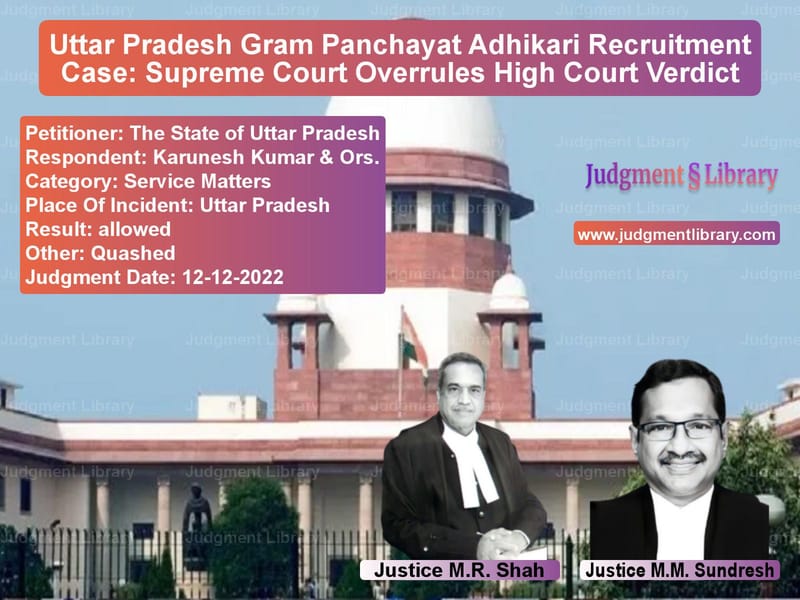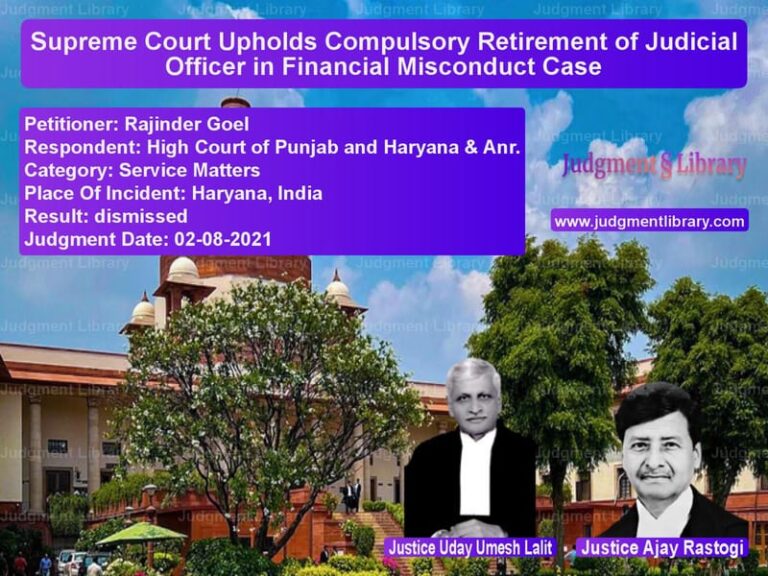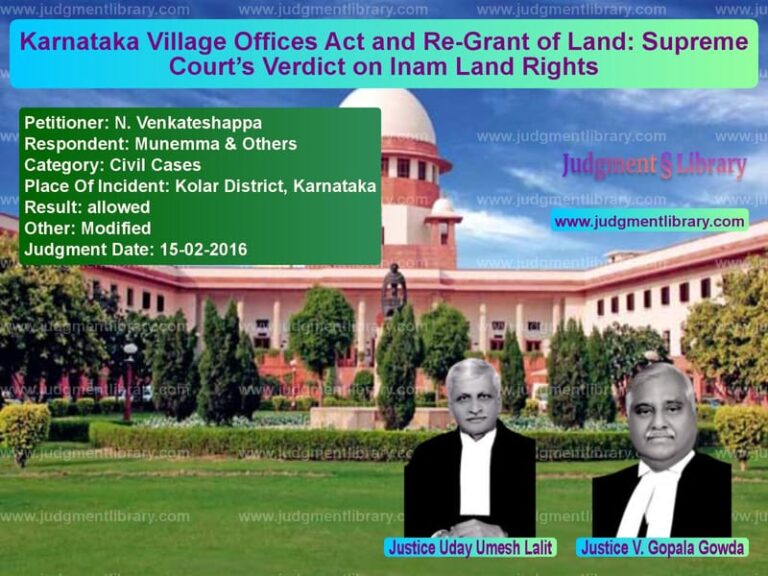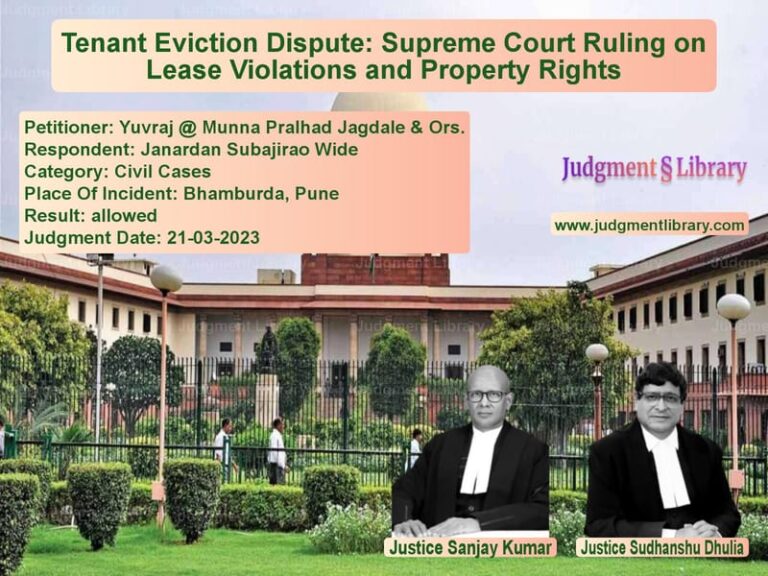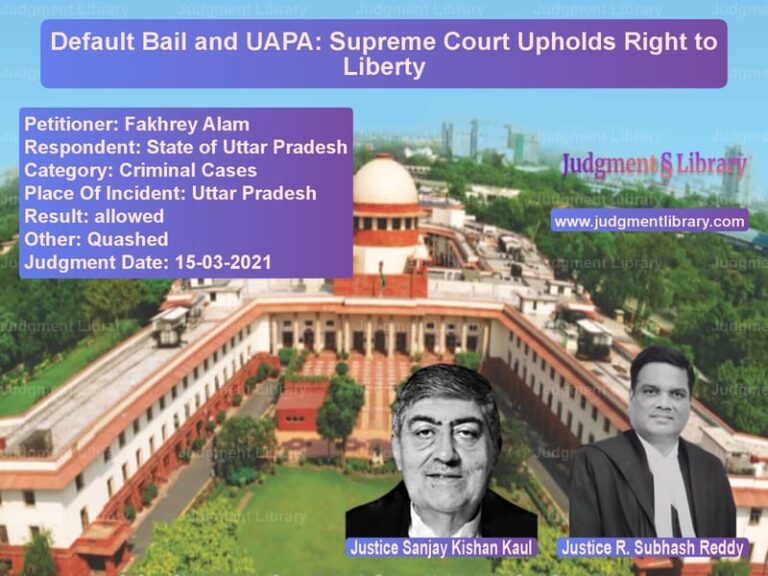Uttar Pradesh Gram Panchayat Adhikari Recruitment Case: Supreme Court Overrules High Court Verdict
The Supreme Court of India recently delivered a crucial judgment in the case of The State of Uttar Pradesh vs. Karunesh Kumar & Ors., addressing the legality of recruitment processes for the post of Gram Panchayat Adhikari under the Uttar Pradesh Subordinate Services Selection Commission (UPSSSC). The Court ruled that the selection process must be conducted strictly as per the Uttar Pradesh Direct Recruitment to Group ‘C’ Posts (Mode and Procedure) Rules, 2015, and not under the earlier Uttar Pradesh Gram Panchayat Adhikari Service Rules, 1978.
The judgment clarified that vacancies left unfilled due to the non-joining of selected candidates should be carried forward to the next recruitment cycle and not be filled from a waiting list. The Supreme Court overruled the Allahabad High Court, which had allowed the recruitment of additional candidates beyond the list prepared by the UPSSSC.
Background of the Case
The dispute arose from the recruitment process for 3587 Group ‘C’ posts of Gram Panchayat Adhikari initiated in 2015. The recruitment process involved a written examination followed by an interview. The controversy emerged when certain candidates who were not on the final selection list sought appointment on the basis that they were on an extended merit list.
The key events leading up to the case were as follows:
- June 22, 2015: Advertisement issued for recruitment of 3587 Gram Panchayat Adhikari posts.
- December 24, 2016: The final result was declared.
- April–May 2017: Appointment letters issued to selected candidates.
- 2018: The Allahabad High Court ruled that waiting list candidates should also be considered for unfilled vacancies.
- December 12, 2022: The Supreme Court overruled the High Court’s decision, restoring the order of the Single Judge and affirming that vacancies must be carried forward.
Arguments by the Appellant (State of Uttar Pradesh)
The counsel for the State of Uttar Pradesh presented the following arguments:
- The recruitment process was conducted as per the 2015 Rules, which do not provide for a waiting list.
- The 2014 Act established the UPSSSC as the sole recruitment authority, overriding the older 1978 Rules.
- The Allahabad High Court erred in applying Rule 15 of the 1978 Rules, which was no longer applicable after the introduction of the 2015 Rules.
- The vacancies left unfilled due to non-joining candidates should be carried forward to the next recruitment cycle, rather than filled from a waiting list.
Arguments by the Respondents (Candidates)
The respondents, representing candidates who were not initially selected, countered:
- The 1978 Rules, which allowed for an extended merit list, should apply.
- The 2016 amendment to the 1978 Rules clarified the use of merit lists and should be honored.
- They had a legitimate expectation of being considered for appointment if vacancies remained.
- The recruitment process should be interpreted to maximize opportunities for qualified candidates.
Supreme Court’s Judgment
The Supreme Court ruled in favor of the State of Uttar Pradesh, setting aside the Allahabad High Court’s order. The key findings included:
- The 2015 Rules were enacted specifically to govern Group ‘C’ posts, including the Gram Panchayat Adhikari position.
- The UPSSSC was designated as the sole recruitment authority under the 2014 Act, superseding the older selection process.
- “A waiting list cannot be used as a perennial source of recruitment” and vacancies should be carried forward.
- The High Court erred in applying the 1978 Rules, as they had been overridden by the 2015 Rules.
Legal Precedents Cited
The Supreme Court referred to several landmark cases, including:
- Ajoy Kumar Banerjee vs. Union of India (1984): Held that later laws override earlier ones if they are inconsistent.
- Surinder Singh vs. State of Punjab (1997): Stated that candidates cannot claim automatic rights to appointment based on waiting lists.
- Anupal Singh vs. State of U.P. (2020): Confirmed that recruitment rules in force at the time of appointment should apply.
Impact of the Judgment
The Supreme Court’s ruling has major implications:
- Ensures clarity in recruitment processes: Only candidates from the merit list forwarded by UPSSSC can be appointed.
- Prevents misuse of waiting lists: Unfilled vacancies must be carried forward instead of being arbitrarily filled.
- Affirms legislative supremacy: The 2015 Rules take precedence over older rules.
- Streamlines governance: Reinforces the UPSSSC’s role as the sole recruiting body.
Conclusion
The Supreme Court’s decision in The State of Uttar Pradesh vs. Karunesh Kumar & Ors. reinforces the principle that recruitment processes must be conducted strictly according to statutory rules. By upholding the 2015 Rules and setting aside the High Court’s judgment, the ruling ensures that government hiring remains transparent, consistent, and free from arbitrary modifications.
The verdict clarifies that candidates who do not make it to the final merit list cannot claim appointments, ensuring that government recruitment remains structured and predictable.
Petitioner Name: The State of Uttar Pradesh.Respondent Name: Karunesh Kumar & Ors..Judgment By: Justice M.R. Shah, Justice M.M. Sundresh.Place Of Incident: Uttar Pradesh.Judgment Date: 12-12-2022.
Don’t miss out on the full details! Download the complete judgment in PDF format below and gain valuable insights instantly!
Download Judgment: the-state-of-uttar-p-vs-karunesh-kumar-&-ors-supreme-court-of-india-judgment-dated-12-12-2022.pdf
Directly Download Judgment: Directly download this Judgment
See all petitions in Recruitment Policies
See all petitions in Public Sector Employees
See all petitions in Judgment by Mukeshkumar Rasikbhai Shah
See all petitions in Judgment by M.M. Sundresh
See all petitions in allowed
See all petitions in Quashed
See all petitions in supreme court of India judgments December 2022
See all petitions in 2022 judgments
See all posts in Service Matters Category
See all allowed petitions in Service Matters Category
See all Dismissed petitions in Service Matters Category
See all partially allowed petitions in Service Matters Category

